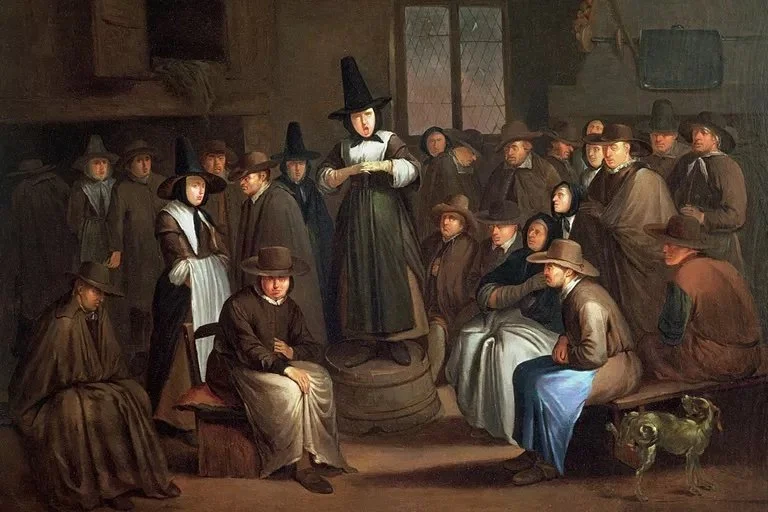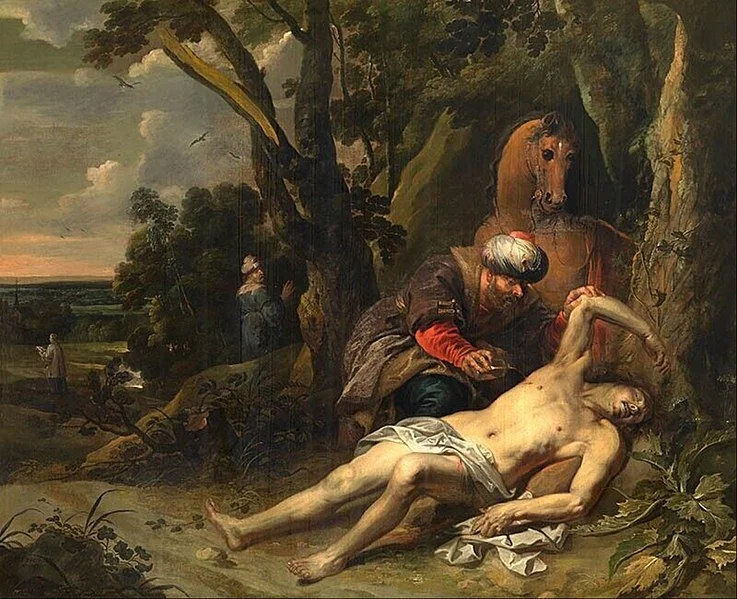When Truth is Laid Bare, Apocalyptic Pathway to Truth Telling
One of the unexpected perks of being a Quaker is that you frequently get the opportunity to tell someone you are a Quaker. Sometimes it feels like telling someone you are a dinosaur or a saber tooth tiger. You emerged from the land of extinction, dressed in civilian clothes. The question that follows almost always has to do with practice. “What do you guys, like, do?” Besides the shock of our actual breathing bodies, there is equal confusion that people like us actually like sitting quietly in a room together. What we do in that silence is often where the shock turns to intrigue.
Quakers Meeting. Egbert van Heemskerk the Elder
When the purpose of the silence is shared, namely that each of us opens ourselves to God’s voice and is given authority and expected to share that message, this is when folks see a practice that doesn’t just say it values everyone’s voice, but actively practices it. Inevitably our leadership structure is investigated. Often the power for decision-making in a Church rests with a handful of individuals. That we use a collaborative decision-making model also fascinates folks.
I think we can forget just how strange our way of doing things may seem to folks outside of our Meetinghouse. I imagine that the reality of an individual's responsibility to a Quaker meeting may feel too great for some. Perhaps some folks are content to let the decision-making to a handful of people. After all, I would be quite all right with someone other than myself making the decision about where or what we will eat for dinner most days of the week. The fatigue that comes from assuming responsibility and making decisions is real.
This model of decision-making isn’t too common. While our votes and political action hopefully influence our elected officials to do what we want them to, we often feel at the whim of our politicians or Supreme Court Justices. A command chain of higher-ups steers the direction of the companies we work for. What we pay for gasoline is controlled by forces mostly out of our control.
So, yes, there seem to be as many things we bear the responsibility to make decisions on, as there are decisions we have no power over. But it is a particularly intriguing invitation to be co-decision makers alongside God when it comes to the direction of our faith community.
My message last week was about discerning Truth, and I used Mary Oliver’s poem “Wild Geese” as an example of one way of paying attention to Truth. Mary invites us to simply let the soft animal of our body love what it loves. A few years ago I gave a message about the Good Samaritan story. I kind of geeked out on the scripture. In the text of the Good Samaritan story is verse 33 which reads
“But a Samaritan while traveling came near him, and when he saw him he was moved with compassion.”
Balthasar van Cortbemde - The Good Samaritan
The Greek word used for compassion here is this “splagchnizomai” The noun form of this was used to describe the inner parts of a sacrificial victim, and here we get a bit gory, it was used to describe the heart cut out during a sacrifice. The word over time evolved to become a more generic term for inner organs, including the womb, and then evolved even further to be a word that describes impulsive passions. By the time we read the word here in Luke, it has come to be understood as a stirring up of one's entrails, or a visceral response. So this compassion that the Samaritan experiences, was a stirring up in the depths of his guts, it was a visceral, impulsive, immediate act of compassion. It was void of reluctance about ritual around cleanliness, it was real, it was human, and it wasn’t tied up in conditions. I think Jesus is telling his audience, be like your enemy, the Samaritan, respond to the stirring in your guts to be compassionate, don’t ignore that heartbreak, don’t hold back, don’t hesitate, be impulsive, maybe even reckless in responding to those in need, in coming alongside a victim.
I think that is how we discern Truth sometimes, we simply pay attention to the soft animal in our bodies loving what it loves, or we simply go with our guts.
But I think that if we are to commit ourselves to being a faith community that shares the responsibility of discerning Truth together, we need to prepare ourselves for all of the ways this may happen. While an audible and disorienting voice outside our own internal one may speak to us, it is also (and probably more likely) that we will need to sort through our feelings and thoughts to get to that still small voice.
I was reminded of another way Truth is revealed this week; this video clip illustrates it perfectly.
In this iconic scene, Toto initiates an apocalypse. Y’all probably remember the meaning of the word apocalypse, which is “unveiling.” These are times in our personal lives, or our communal life when the curtain is pulled back and the Truth is laid bare. This type of Truth discernment is abrupt for some. It can be jarring. It also has a ripping off the bandaid feel to it. It is an instant “aha” moment. There is a satisfying efficiency to it. There is no more quibbling or wondering to be done. In this way, it feels like a gift.
I still think an apocalypse isn’t something to always celebrate, even if it is an effective teacher. That is because the truth has either been festering under an intentional covering or has been purposefully hidden by something. More than likely, someone is suffering because of this veil, and those of us who have been hidden from it can benefit from its continued concealment. Yes, apocalypse leads to liberation, but often liberation that is far too delayed.
I remember the anger communities of color felt towards white folks who were shocked by the video of Derek Chauvin kneeling on the neck of George Floyd as he lay arrested on the pavement. The “I had no idea it was this bad” comes after ages of communities of color telling us this was happening. We couldn’t see or chose not to see the truth, even though people have tirelessly tried to pull back the curtain.
The pandemic pulled back many curtains. Like just how many of our fellow humans are unwilling to commit to the goal of shared public health because of the idol of individual liberties.
These types of unveilings can feel particularly disorienting to Quakers because they run counter to our preferences for measured and paced discernment. We may even reject the Truth laid bare because it has come to us too abruptly.
In the coming weeks and months, I anticipate that our community will need to do some heavy discernment work. As we head into the last week of Klarissa’s released time as a minister, our community will once again be tasked with figuring out God’s longing for us. I imagine that this work will be a mix of Mary Oliver-like Truth discerning, paying attention to where love is speaking to us in our bodies, and also apocalyptic Truth-telling, where we collectively see what is behind the veil.
These are not the only two ways we will know the Truth among us, but they may be two ways for us to pay attention to. I hope we don’t feel too daunted by this process. It will be an opportunity to live into our uniquely Quaker way. That you, your story, your experience, and your Truth will be a part of this…I hope that feels delightfully invitational and hopeful.
Some Queries:
How has Truth been revealed apocalyptically in your life? What was that experience like?
What Truth do you think is begging for an apocalypse?

